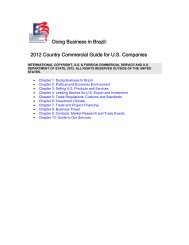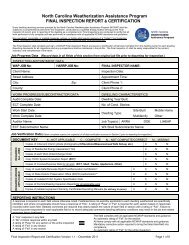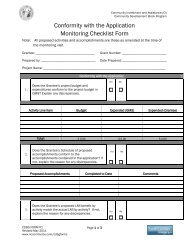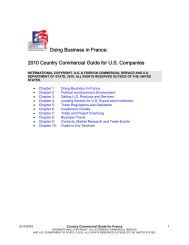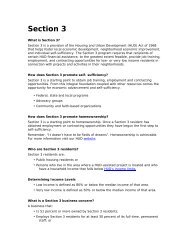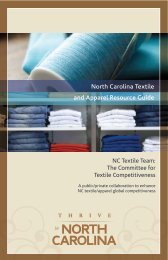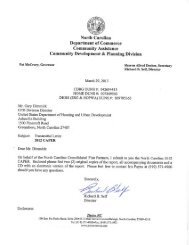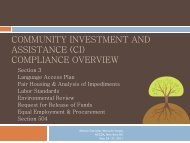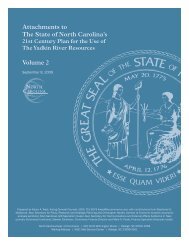Doing Business In (Insert Country Name Here) - Department of ...
Doing Business In (Insert Country Name Here) - Department of ...
Doing Business In (Insert Country Name Here) - Department of ...
You also want an ePaper? Increase the reach of your titles
YUMPU automatically turns print PDFs into web optimized ePapers that Google loves.
Expropriation and CompensationReturn to topUnder NAFTA, Mexico may not expropriate property, except for a public purpose and ona non-discriminatory basis. Expropriations are governed by international law, and requirerapid fair market value compensation, including accrued interest. <strong>In</strong>vestors have the rightto international arbitration for violations <strong>of</strong> this or any other rights included in theinvestment chapter <strong>of</strong> NAFTA.There have been twelve arbitration cases filed against Mexico by U.S. and Canadianinvestors who allege expropriation, and other violations <strong>of</strong> Mexico's NAFTA obligations.Details <strong>of</strong> the cases can be found at the <strong>Department</strong> <strong>of</strong> State Website, Office <strong>of</strong> theLegal Advisor (www.state.gov/s/l).Dispute SettlementReturn to topChapter Eleven <strong>of</strong> NAFTA contains provisions designed to protect cross-borderinvestors and facilitate the settlement <strong>of</strong> investment disputes. For example, each NAFTAParty must accord investors from the other NAFTA Parties national treatment and maynot expropriate investments <strong>of</strong> those investors except in accordance with internationallaw.Chapter Eleven permits an investor <strong>of</strong> one NAFTA Party to seek money damages formeasures <strong>of</strong> one <strong>of</strong> the other NAFTA Parties that allegedly violate those and otherprovisions <strong>of</strong> Chapter Eleven. <strong>In</strong>vestors may initiate arbitration against the NAFTA Partyunder the Arbitration Rules <strong>of</strong> the United Nations Commission on <strong>In</strong>ternational TradeLaw ("UNCITRAL Rules") or the Arbitration (Additional Facility) Rules <strong>of</strong> the <strong>In</strong>ternationalCenter for Settlement <strong>of</strong> <strong>In</strong>vestment Disputes ("ICSID Additional Facility Rules").Alternatively, a NAFTA investor may choose to use the registering country's courtsystem.The Mexican government and courts recognize and enforce arbitral awards. TheEmbassy has heard <strong>of</strong> no actions taken in the Mexican courts for an alleged Chapter 11violation on behalf <strong>of</strong> U.S. or Canadian firms.There have been numerous cases in which foreign investors, particularly in real estatetransactions, have spent years dealing with Mexican courts trying to resolve theirdisputes. Often real estate disputes occur in popular tourist areas such as the Yucatan.American investors should understand that under Mexican law many commercialdisputes that would be treated as civil cases in the U.S. could also be treated as criminalproceedings in Mexico. Based upon the evidence presented a judge may decide to issuearrest warrants. <strong>In</strong> such cases Mexican law also provides for a judicial <strong>of</strong>ficial to issue an"amparo" (injunction) to shield defendants from arrest. U.S. investors involved incommercial disputes should therefore obtain competent Mexican legal counsel, andinform the U.S. Embassy if arrest warrants are issued.Performance Requirements and <strong>In</strong>centivesReturn to topThe 1993 Foreign <strong>In</strong>vestment Law eliminated export requirements (except formaquiladora industries), capital controls, and domestic content percentages, which areprohibited under NAFTA. Foreign investors already in Mexico at the time the law




